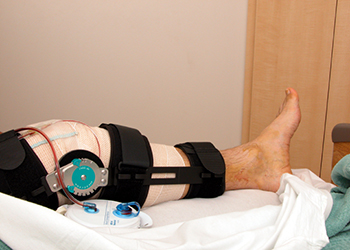
The issue
CHSPR researchers, led by Drs Mieke Koehoorn and Chris McLeod, evaluated the effects of surgical setting and expedited status on disability duration among injured workers.
For WorkSafeBC, this is a policy-relevant question. They pay an additional surgical fee supplement to expedite care, and also pay higher fees for surgeries in private clinics, with the goal of reducing surgical wait times and disability time for injured workers.
The CHSPR team chose work-related knee surgery claims for their studies. Knee injuries have decreased in the past decade, but remain a serious and costly problem for workers and the healthcare system. Chronic and recurrent conditions can result in long-term disability, and in BC, musculoskeletal injuries accounted for almost 60% of all lost-time claims and disability days and costs.
In one study, the CHSPR team collated surgical wait-times and post-surgery return-to-work times among a sample of BC workers with knee injuries. Their aim was to see whether expedited surgery in private or public settings would impact the disability duration of injured workers.
In a related study, the team identified other factors that impact the RTW time. This study linked sociodemographic factors like age, income, gender, and occupation, and return-to-work status (such as full or partial duties) after knee surgery.
Researchers from the University of British Columbia’s Centre for Health Services and Policy Research collaborated with WorkSafeBC to create a comprehensive picture of BC workers’ health and wellbeing. With Population Data BC as their data partner, the team has pioneered work-related health research using routinely collected health and compensation data from multiple sources.
Data sources linked
- Administrative claims data (WorkSafeBC)
- Surgery and clinical records (WorkSafeBC)
What did we learn?
- Workers who had expedited surgery in a public hospital, had the shortest disability duration
- The expedited fee reduced wait time by about 2 weeks in both private and public settings
- Surgeries performed in public hospitals had a shorter return-to-work time (~1 week)
- Overall differences of approximately 3 work weeks in disability duration may have meaningful clinical and quality of life implications for workers. However, minimal differences in return-to-work outcomes suggest that a future economic evaluation of workers’ compensation policies related to surgical setting is warranted.
- Women, workers of low socio-economic status, and those in physically demanding jobs are less likely to fully return to work after knee surgery following an occupational injury.
"The partnership between UBC and WorkSafeBC demonstrates the power of working together to use administrative health data to answer policy relevant research questions.
This project provided evidence of the effect of a WorkSafeBC policy to inform and improve the provision of health services to injured workers in British Columbia. This was made possible because of the resources provided by Population Data BC for accessing administrative health data."
Mieke Koehoorn, PhD, Associate Professor and Michael Smith Foundation for Health Research Senior Scholar School of Population and Public Health
University of British Columbia
Making a difference
The findings point to the need for an economic evaluation of workers’ compensation policies related to paying surgical fee supplements to expedite care, and paying higher fees for surgeries in private clinics. WorkSafeBC now has evidence to evaluate their current medical program and treatment options.
- This study also touches on the question of privately delivered health services under a publicly funded mechanism. Provincial and national health agencies will gain an understanding of expedited and private clinic services and the health outcomes associated with these policies.
- Broader determinants such as gender, income level and occupation-type significantly affect worker health. For a stakeholder like WorkSafeBC, these results can impact policies that manage occupational injury, access to health services and disability compensation to support BC workers’ and improve their ability to return to their vocation after an injury.
- Future research will compare other outcomes of expedited (public and private) and public, non-expedited surgeries. These outcomes can include complications following surgery and re-injury.
